John Douglas Thompson and Alfred Molina’s clash of titans transcends dated ‘Inherit the Wind’
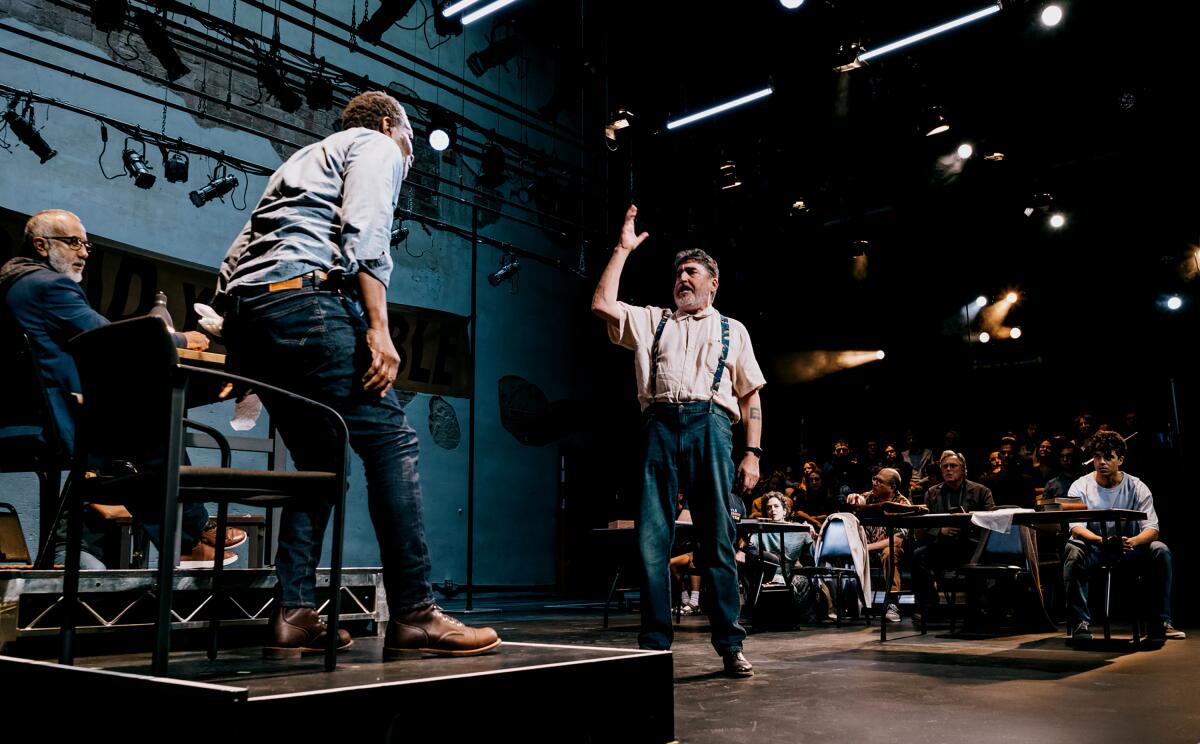
- Share via
“Inherit the Wind,” the 1955 courtroom drama by Jerome Lawrence and Robert E. Lee about the battle to teach evolution in the public schools, only seems to grow in relevance as politicians exploit religion as a wedge issue to shore up their populist appeal.
The play’s style is dated, but the issues are evergreen in anti-vax America. A fictionalized account of the 1925 Scopes “monkey” trial that took place in Tennessee, “Inherit the Wind” tells the story of a public high school teacher who is arrested for introducing his students to Charles Darwin’s theory of evolution.
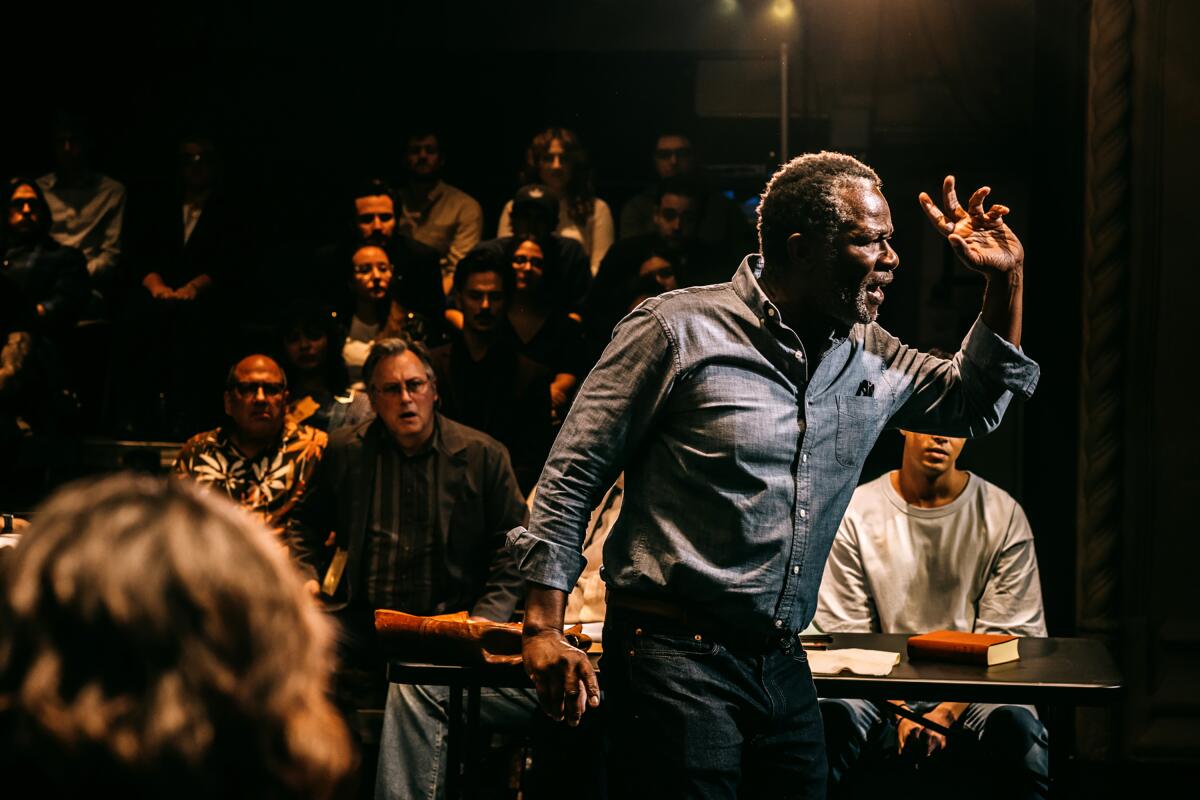
The idea that humankind descended from the apes has the town’s pious power brokers up in arms. Anything that contradicts the Book of Genesis is anathema to them. It makes no difference whether their beliefs fly in the face of scientific evidence or even common sense.
The setting is Hillsboro, a backwater that E.K. Hornbeck (Chris Perfetti from ABC’s “Abbott Elementary”), a sarcastic journalist in the mode of H.L. Mencken, describes as “the buckle on the Bible Belt.” It could be any small town in America in which ignorance is fanned by politicians hellbent on control.
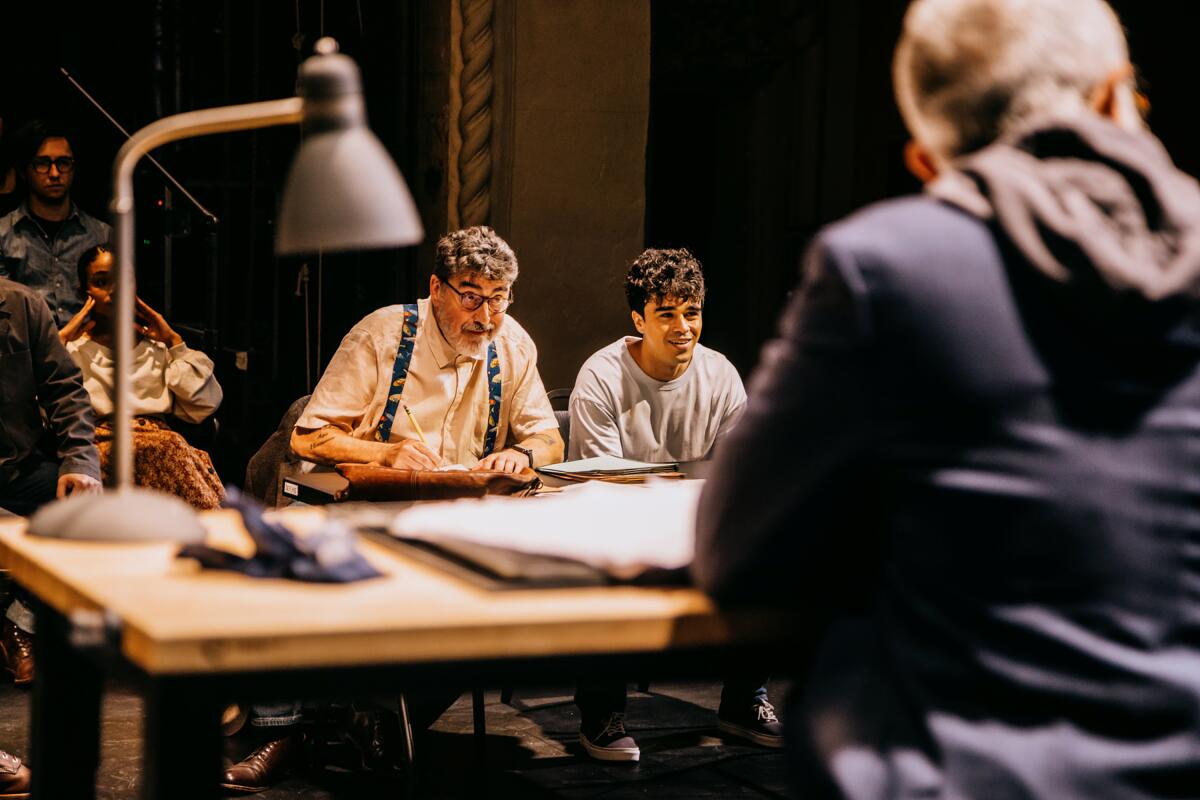
“Inherit the Wind,” which opened on Sunday at Pasadena Playhouse, keeps a respectful distance from the historical record. Director Michael Michetti capitalizes on this artistic license to give the play a modern makeover. The dialogue and characterizations still reveal their age, but the theatrical presentation has been filtered through a 21st century aesthetic.
The cast is multicultural — a clear sign that we’re not in segregated 1925 Dayton, Tenn. The costumes of Sara Ryung Clement are insouciantly contemporary. District Attorney Tom Davenport (Thomas Hobson) wears a distinctly of-the-moment T-shirt. Perfetti’s Hornbeck dons gleaming track pants.
The rawness of Brad Enlow’s scenic design prominently contains a “Read Your Bible” banner on a set that doesn’t at all try to conceal the bones of the theater’s architecture. Michetti’s stripped-down staging searches for the source of the play’s timeliness in the psychological subtext that emotionally fuels the public debate.
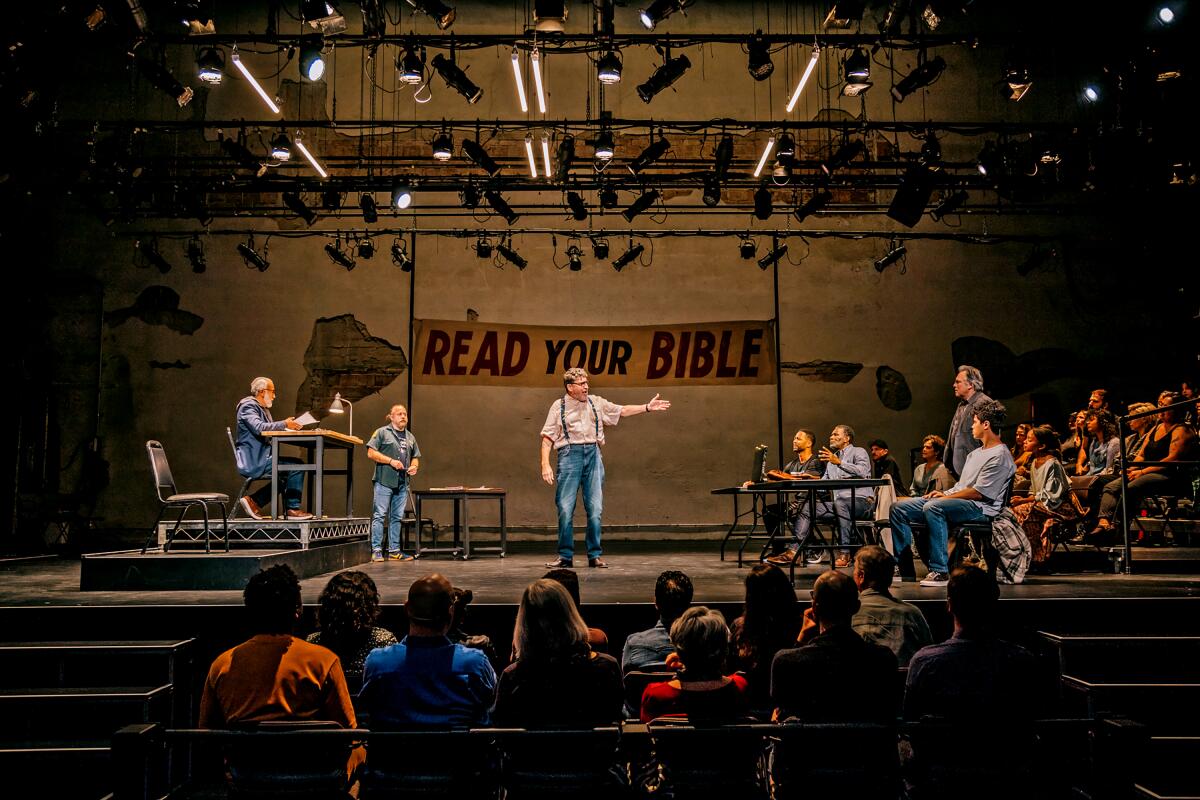
The approach is reminiscent of recent “Our Town” productions that want to discard the sentimental shell of Thornton Wilder’s chestnut to tap into the play’s dark essence. “Inherit the Wind,” popularized by Stanley Kramer’s 1960 film starring Gene Kelly, Spencer Tracy and Fredric March, doesn’t have an analogous existential core. But stark human realities can be glimpsed from the play’s corners.
The fundamental dialectic between religion and science is captured in all its theatrical intensity in the courtroom confrontations between John Douglas Thompson’s Matthew Harrison Brady, the grandstanding holy roller who can’t resist the political opportunity of prosecuting a heathen, and Alfred Molina’s Henry Drummond, the city-slicker defense counsel who is waging a battle not simply to free Bertram Cates (Abubakr Ali), the enlightened teacher, from jail but to stop the forces of ignorance from undermining America’s future.
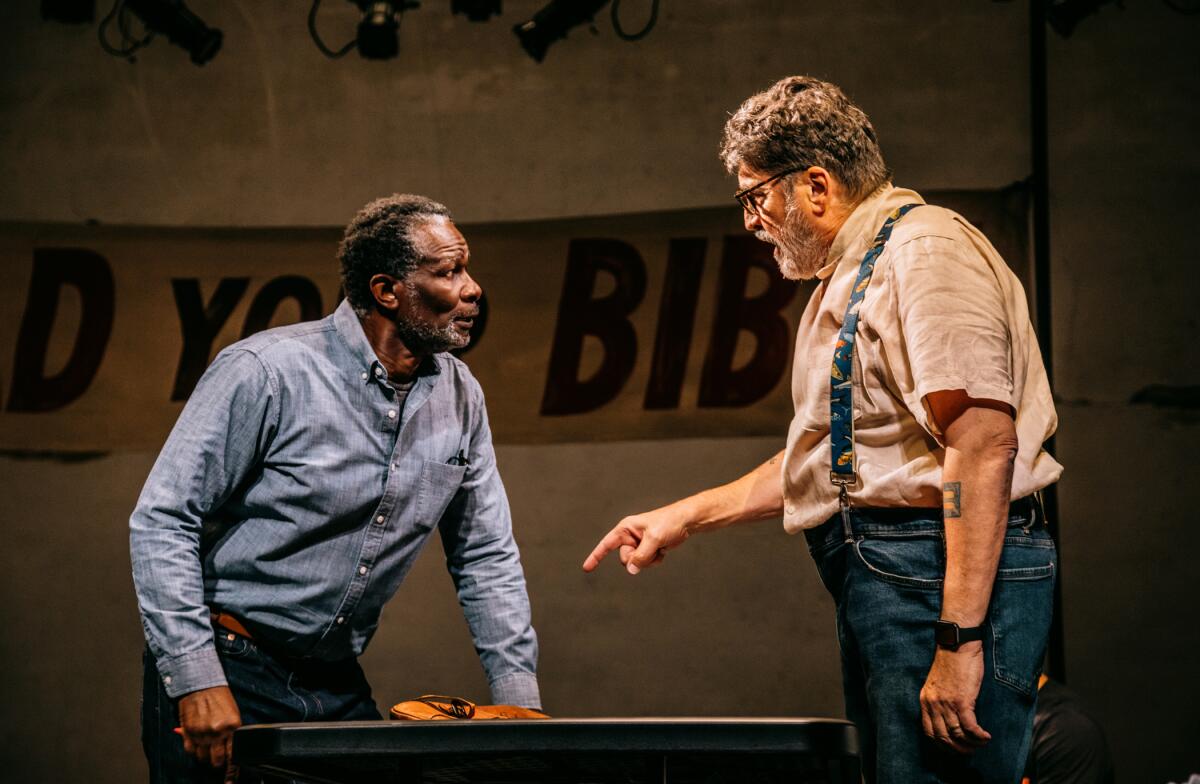
Thompson, one of the most accomplished classical actors working today, treats Brady as though he were a Shakespearean character. With a golden voice capable of transforming prosaic speech into burning soliloquy, he finds tragic amplitude in flights of rhetoric that reach emotional heights more through the breath and sound of religious fervor than through textual meaning.
Molina, the embodiment of theatrical excellence, is perfectly cast as the rational counterpoise to Brady’s zealotry. As Drummond, he grounds the play in an intelligence that recognizes the irrational part of human nature. His ironic remarks are biting, but he never sacrifices fellow-feeling for superiority. He fights on behalf of intellectual freedom — which includes both the freedom to believe and not to believe.
The stakes are so high that it’s hard not to wish that the dramatic writing were better. Hornbeck, a choral figure in the play, talks like old Hollywood’s idea of a cynical reporter. Perfetti gives him an effete contemporaneity, but the character needs new lines more than a new look.
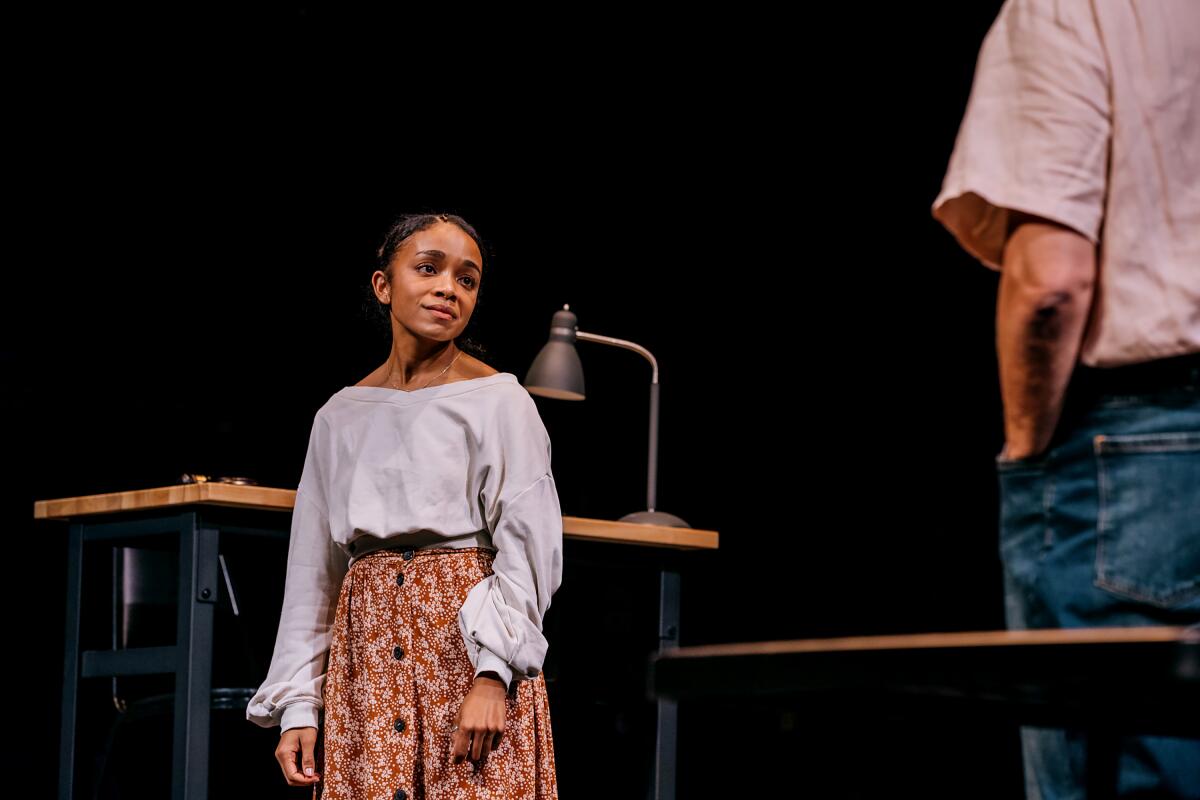
Rachel Hilson brings sharp poignancy to the role of Rachel Brown, whose romance with Cates is complicated by her being the daughter of the Rev. Jeremiah Brown (David Aaron Baker), the man leading the charge against the science teacher who believes in science. On the stand, under probing questioning by Brady, she struggles to complete a sentence, so overwhelmed is she with divided loyalties.
Hilson’s performance is of a different register than most of the rest of the cast — haltingly realistic in an otherwise declamatory play. But Ali also finds ordinary personal truth in his portrayal of Cates as a teacher who isn’t so much on a heroic mission as simply following the dictates of his conscience.
The second act of Michetti’s production, when the courtroom battle is in full gear, is more gripping than the more expositional first half. The trial, presided over by a judge (Rene Rivera) who has a thumb on the scale for the prosecution, suspensefully tracks the myriad obstacles in the way of justice.
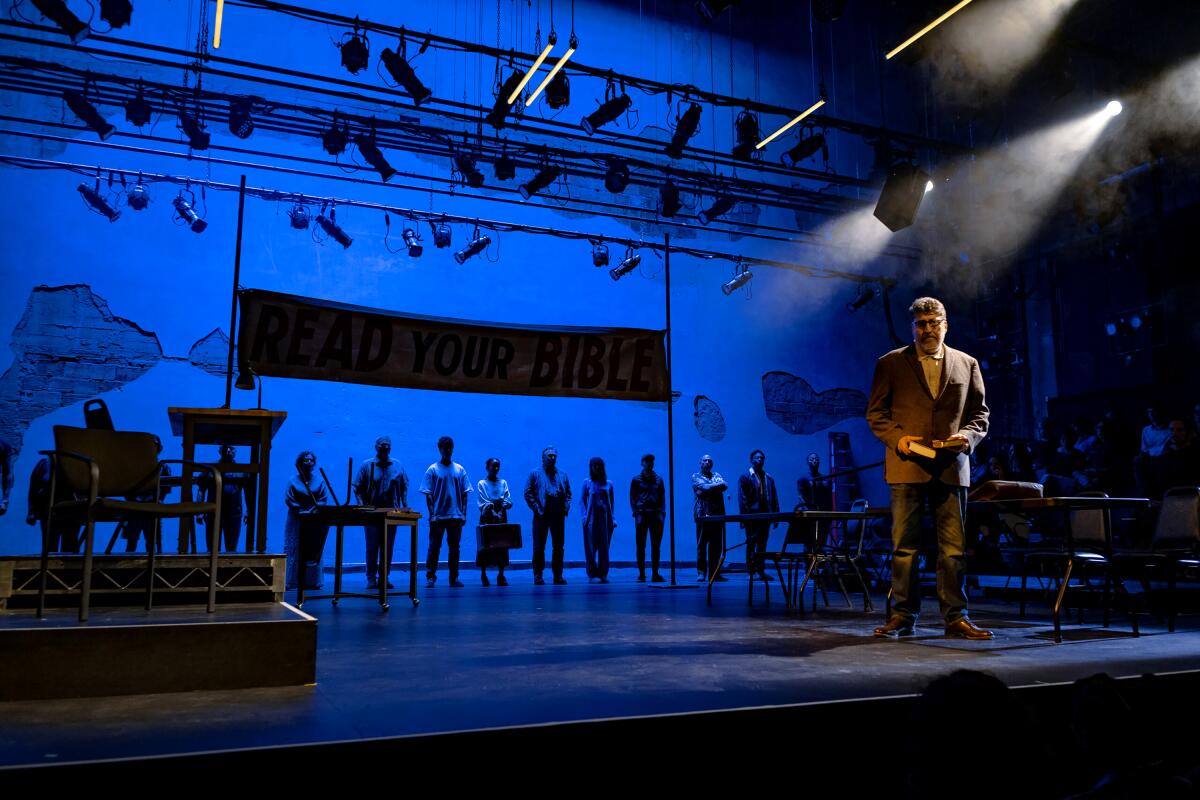
“Inherit the Wind” takes the long view on historical matters, recognizing that legal setbacks can be part of the uneven path of progress. The play might be a cultural landmark, but I’m not convinced by this engaging production (any more than I was by the 2007 Broadway revival) that it’s a dramatic classic.
The urgency of the subject matter, however, is never out of season. Textbook censorship and book bans are limiting the horizons of America’s youth. Under the guise of morality, benighted political interests are being advanced. Democracy can only founder when the nation grows dumber. Perhaps the return of Henry Drummond to the stage will inspire others to take up his cause of nonpartisan freedom.
'Inherit the Wind'
Where: Pasadena Playhouse, 39 S. El Molino Ave., Pasadena
When: 8 p.m. Tuesdays-Fridays, 2 and 8 p.m. Saturdays, 2 and 7 p.m. Sundays. (Check for exceptions.)
Tickets: Start at $35
Contact: PasadenaPlayhouse.org or (626) 356-7529
Running time: 2 hours, 15 minutes
More to Read
The biggest entertainment stories
Get our big stories about Hollywood, film, television, music, arts, culture and more right in your inbox as soon as they publish.
You may occasionally receive promotional content from the Los Angeles Times.











